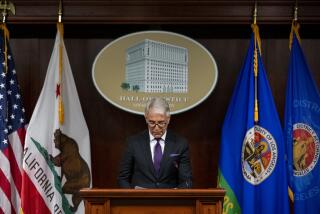Senator Claims Justice Dept. Official Lied
- Share via
WASHINGTON — In an extraordinarily harsh exchange, Assistant Atty. Gen. William Bradford Reynolds was accused Thursday of lying to the Senate Judiciary Committee during 1987 testimony about his role in a Louisiana voting discrimination case.
Sen. Howard M. Metzenbaum (D-Ohio), shouting at Reynolds during a hearing by the same panel Thursday, said: “I wasn’t being casual when I asked the chairman to swear you in.”
After the hearing, Reynolds denied Metzenbaum’s accusation, contending that it was based on a fragmentary record of what took place in the Louisiana case. “In his usual style, he has pieced together memos to show there was a raging war in the (Justice Department’s civil rights) division,” Reynolds said in an interview.
Biting words are not unusual when Reynolds appears before the committee, which rejected his nomination to become associate attorney general in 1985 on grounds that he repeatedly had misled the panel in sworn testimony. His dual position as Atty. Gen. Edwin Meese III’s counselor adds to the tension between him and some panel members who have been highly critical of Meese.
But Thursday’s exchanges went beyond the expected when Reynolds, in a statement, accused committee Democrats of delivering “shop-worn speeches” on civil rights while “shamefully exempting Congress from the anti-discrimination provisions” of civil rights laws.
The previous Reynolds testimony that drew the accusation of lying from Metzenbaum was given on March 10, 1987, about a 1986 voting rights case in which the Republican National Committee allegedly took part in efforts to remove black voters from Louisiana voting rolls.
In that testimony, Reynolds said in response to a question from Metzenbaum: “. . . It was the agreement of all of us that looked at it that we could not find a violation of the Voting Rights Act that would allow us to go in and prosecute in that circumstance, and that was the conclusion of everybody who looked at the matter.”
Metzenbaum: “Who is ‘everybody’?” Reynolds: “Well, the people in the (department’s) voting section who are responsible for evaluating these and giving me a recommendation.”
But, at Thursday’s hearing, Metzenbaum cited and distributed an Oct. 7, 1986, memorandum from Rebecca J. Wertz, an attorney in the voting section, recommending to the chief of the section, Gerald W. Jones, that an FBI investigation be conducted in the Louisiana case.
On the 12th and final page of Wertz’s memo is a handwritten note initialed by Reynolds in which he wrote: “There is under the circumstances no legitimate reason to initiate an FBI investigation of the La. activities . . . . On the other hand, there appears to be a concern of possible harassment, fraud and intimidation of blacks in the upcoming election. To the extent such behavior is found, we may well want to initiate an FBI investigation after the Nov. 4 elections.”
In addition, Metzenbaum put into the record a handwritten internal routing slip sent to “Brad” by James P. Turner, the No. 2 man in the civil rights division, who noted that a civil suit over the voter purging effort had been settled with an agreement by the Republicans to cancel any further activity.
“However, our jurisdiction may be criminal and arguably not affected by settlement,” Turner wrote.
After the hearing, Turner said Reynolds wrote the note on Wertz’s memorandum at a time when other officials in the civil rights division had decided to hold off on any FBI investigation at least until after the Nov. 4 election, then only a week away.
“Brad was addressing my suggestion that we wait until after the election,” Turner said. “When you’re talking about sending (in) the FBI around election time, you have to be concerned what impact it will have.
“Sen. Metzenbaum is wrong in suggesting my note proves Brad lied,” he added.
More to Read
Get the L.A. Times Politics newsletter
Deeply reported insights into legislation, politics and policy from Sacramento, Washington and beyond. In your inbox twice per week.
You may occasionally receive promotional content from the Los Angeles Times.










